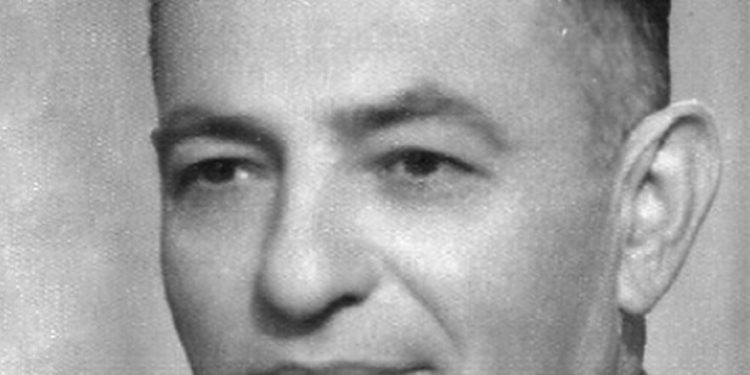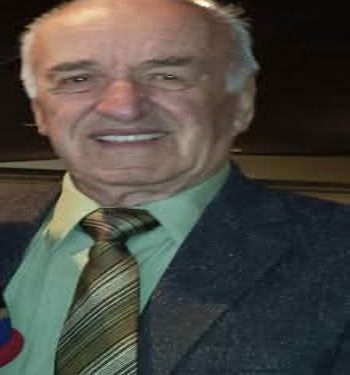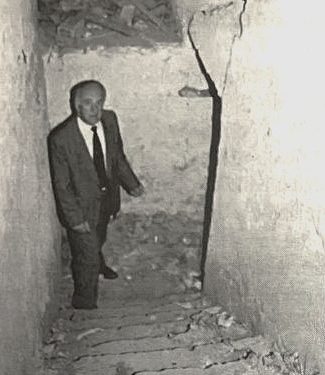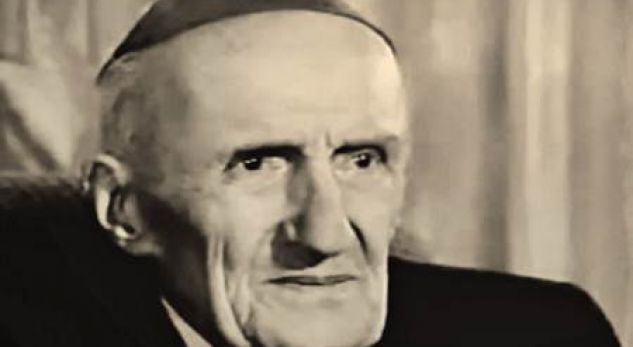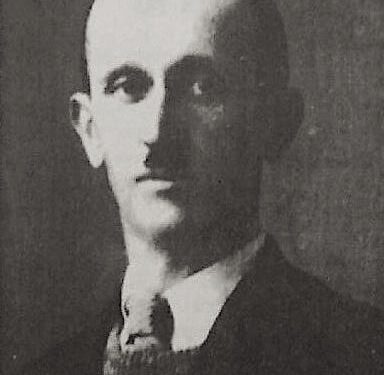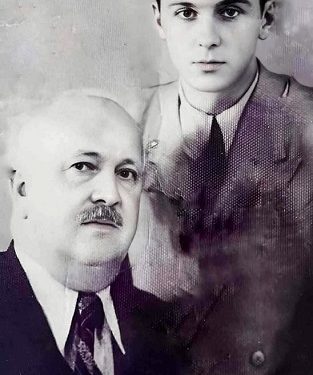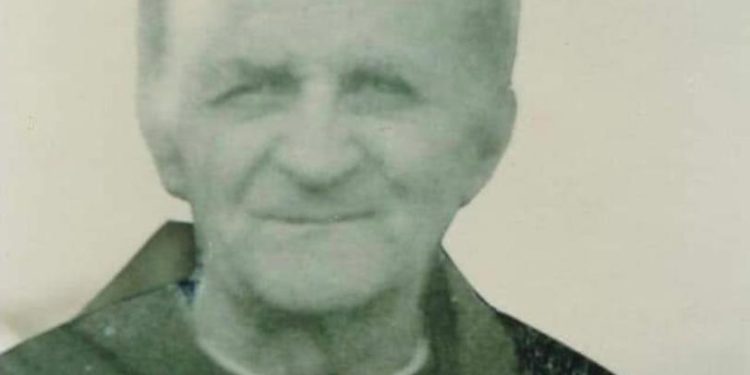By Ahmet Bushati
Part fifty-six
Memorie.al/ After the flag was altered in 1944 with the addition of the communist star, Shkodra transformed into a center of resistance against the regime, paying a high price for its tradition of freedom. By April 1945, high school students, already feeling betrayed by the promises of the war, gathered to oppose the new terror that imprisoned and killed innocent people. Communism turned Kosovo into a province of Yugoslavia, while Shkodra was punished for its “historical crime”- its defiance against invaders. The “Postriba Movement” became a tool to suppress all dissent, plunging the city into an unprecedented spiral of suffering: imprisonments, executions, and the destruction of families. The high school students, alongside citizens, became symbols of resistance, while some “young communists” turned into tools of the State Security, leading to expulsions, imprisonments, and internments.
Four times, Shkodra rose in armed rebellion, but history forgot these battles. This book is written to remember the countless prisoners, the tortured, the killed, and the parents who suffered in silence. It is a warning against dictatorship and a plea for future generations not to forget the sacrifices made for freedom.
Continued from the previous issue
In the Footsteps of a Diary
For no more than three months, in the wonderful camp of Berat
You close the parenthesis and open it for Maliq Bushati, let’s go back once again to that Saturday and the food brought from Shkodër. As the next day was a day off, we decided that for breakfast, “Daja” would make us pancakes. “Daja” who usually went early even on Sundays for a coffee and a gypsy cake that he would drink, that Sunday he got up even earlier than the other times, so that when the rest of us woke up, the pancakes would be ready. When I was going to sleep in my shed, I said to “Daja”, “Uncle, that tin you know about”!? – he meant that “Daja” should fill a tall, cylindrical tin container with pancakes, with a lid, which we kept as the largest one we had.
The next day, “Uncle”, as he had fried and fried pancakes, like the “teraq” of coffee, he had not spoiled it, except for one last time, when, to his greatest annoyance, he had noticed that those pancakes, he had mistakenly fried with fish sauce! Until I went, he had cursed and cursed his pancakes several times, and when I still did not get close enough, I would ask him: “Hey ‘Uncle’, did you make them for us”? – he would look me in the face, and would answer me with all annoyance: “Come on, you damned eater, I made them with fish sauce”!
I, not only to calm him down, would tell him: “Uncle, as for me, don’t worry at all, because I eat them just like they were with other sauces”. And the truth was, that with the exception of Uncle, the rest of us ate them, really enjoying them, as if they were of another kind. The name of Dr. Isuf Hysenbegas would be associated with the respect and gratitude of thousands of prisoners who had spent several years in labor camps, having found in that doctor and man, always a reliable support, just as many would be those who would dedicate the salvation of their lives to Dr. Isuf.
In this man, nature had poured out without sparing the best human qualities, having made him not only a doctor and a master, but also their friend to the prisoners. Even some criminal and very dangerous prisoners, he had won their hearts and, so to speak, had become their “Messiah”, so much so that when after a year Dr. If Isuf were to be transferred to the Bulqiza camp, they, like everyone else without exception, would be upset, to the point that I would tell them that even Korabi – the most dangerous of all the dangerous capos – had shed tears on that occasion.
Only a doctor like Isuf Hysenbegasi could come to us with a pen and paper in his hand, asking us to give him the names of those prisoners who were observing Ramadan, so that he could give them a medical report for that period, not without risk to himself. When we were in Vlashuk, I had a constant temperature of 37.2 – 37.3 degrees every afternoon for two years. The interest that Dr. Isufi would show for me on this occasion would be – without me being given the impression that I understood – like that of a parent. Suspecting that the fever might be coming from the roots of my decayed molars, once, without my consent, he would remove two healthy molars from me with mechanical forceps, one after the other, a removal that should have been less difficult than the cases of our mountaineers, who would attach the decayed molars to each other at the roots with wire red-hot in the fire. I respected Dr. Isuf very much and he loved me just as much. Sometimes, laughing, he would say to me: “Ahmet, I will make you a groom in Vlora”.
The Shtyllas Camp, the Last for Me
From the Vlashuk camp, we were taken to the one of Shtyllasit i Fieri, which was built somewhere below a hill, where the famous Apollonia of two thousand five hundred years ago had radiated much culture and knowledge throughout the Hellenic world, as well as in the Roman one in the East and beyond. In this camp, the New Year of 1954 would occupy us, the eve of which we would celebrate with five or six dried figs per person and, in the least light that “Daja” could achieve, by lighting a small piece of cotton inside a cup filled with water and with very little oil on top.
It was a time when a year had passed since Stalin’s death and when a somewhat improved climate was leading some people to hope for the unblocking of some of the disagreements that had divided the world in two. Kamber Halili, who still continued to be the commander of our camp, at this time would address the prisoners with conviction and desire: “There is no more division. Those great ones are now talking to reconcile, to come to an understanding.” While Kamber Halili was speaking, I was convinced that he was not trying to be demagogic, but that his old spirit, changed by fear deep in his soul by the former servant of a completely different regime, had the opportunity to appear to them without further danger.
However, contrary to the climate in question – which was generally reflected in the softening of the internal policies of every communist country – in Albania, precisely at this time, prominent intellectuals of the country were interned, who would be brought to Shtyllas, to a camp that would be separated from ours only by a strand of barbed wire. Among the Shkodra residents, we would recognize Dom Mikel Koliqi, Hamdi Bushati, Ibrahim Sokoli, Teufik Bekteshi, Karlo Çoba, Rexhep Shazi, Mark Temal, Salvator Kurti, Sabri Quku and, perhaps, others. The above-mentioned persons had generally previously served prison terms.
At this time, planes arriving from Italy at night had dropped leaflets a couple of times around the place where we were working, which contained attacks against our communist regime, as well as short chronicles of the activities of the “Free Albania” Committee, accompanied by some photos of Albanian emigrants with smiling faces, to be distributed in several cities of Italy. We would find these leaflets and pass them from hand to hand, to a majority of the political prisoners, even though the command had already sent police to clear the area of those leaflets.
As proof of the good treatment of the prisoners by the command, there would also be the screening for the first time of several films, where the one of “The New Guard”, by the Russian writer Fadaev, would take me back like a thief ten years, to that happy and romantic time of the war, regardless of whether I, as a result of it, found myself imprisoned there. Regarding the films, among others, one would be shown, about which the prisoners would talk, that the Soviets had made for external consumption, with which they wanted to show the opposing world, their artistic possibilities, deliberately eclipsed by the need for the social and ideological transformation of the country.
At the center of that film, more or less modern and erotic, stood a tall, beautiful, blonde woman, with a free and frank demeanor like that of an Italian, who from time to time in a bathing suit, would expose her magnificent body, next to a fountain of blue water, causing that film, with the interest of some men, especially the ordinary ones, ignited by it, to be shown for seven days in a row. A prisoner from Shkodër, a barber named Ragip Zoga, would say in a loud voice that he had seen that film eight times, adding that time that, as he said, he had also seen it in a dream “beginning and end”.
There in the Shtyllas camp, we made it a rule that every Sunday after lunch, at our sleeping place, fifteen to twenty friends would gather and sing for several hours, mainly patriotic songs, without missing, as always, the “English anthem”, but which we had mistakenly taken for the American one. Around our place, there would be many other prisoners as spectators, who would regularly come from other barracks to listen. Dom Mark Hasi and Ilia Pashuku would be our two “coryphs”. We usually started with the song of “Loredan”, the last Venetian ruler in Shkodra, on the eve of the Turkish invasion of the country, a song that Dom Mark had the most in his heart, and then all the others in turn.
During the intervals, they would improvise various comic numbers, one of which could have been that of Marian Skanjeti of “Daja”, who, proudly wrapped in towels like a dervish, would tirelessly imitate the lost followers of Haxhi Qamili, repeating without stopping; “Dum baba-e, baba-e!” It was the month of March, when one Sunday at dinner, Dr. Isufi came to our place, who, without listening to me sit down, would tell me seriously: “Listen Ahmet, tomorrow Monday, you will come in the morning to be admitted to the infirmary, – (the infirmary was called the hospital inside the camp) – and do not send anyone else to your place, because here I swear to you, that I will send him back, whoever he is. This is your risk”.
Dr. Isufi’s final words and tone, for the first time, I was following without speaking and with a smile, which meant that I had agreed that this time, I would make my bed myself. That morning, when I first entered the infirmary barracks, I was immediately struck by its calm, order, and cleanliness. On both sides of a dirt corridor (the entire surface was dirt there) – beds made of rough planks, produced with makeshift tools by the hands of some imprisoned carpenter or carpenter, were placed in a row. I was directed to a bed, and as soon as I lay down on it, a pleasant feeling of relaxation immediately permeated my entire being.
It was the first time that after four years in the camps, I saw that rest, the freedom of the place, tranquility, cleanliness and generally order, had been put into my service. Only then did I realize how much I had become accustomed to the harsh conditions of a camp, so much so that even the very idea of a better life than the one we were leading had been relegated to the mere meaning of a notion. The environment there seemed quite comfortable to me, much more comfortable than I had been able to imagine, and being inside it, a great favor and privilege. I could not have guessed the great need that I had actually had for that rest, which I had just begun.
Regarding my admission to the infirmary, I realized that my friends, as well as Dr. Isufi, suspected me of some serious illness, although in my presence they acted as if I were taking advantage of the company we had with Dr. Isufi. I myself, despite the fever, was not at all worried, because I was not suffering from anything and felt physically strong. Every day, as soon as my friends came home from work, they would climb to an upper part of the window, from where they could see me and communicate with me.
Every day they would bring me food and fruit, even those that until then, we had not even seen with our own eyes for years. Among other things, they would bring me milk several times, which they could not even imagine entering a prison camp. They also brought me biscuits to eat with marmalade, which was beyond any luxury, considering the conditions of the camp, where the ideal remained, as always, porridge, although it was daily. For all of the above, I constantly protested, while they did the opposite, laughing it off as if it were something not worth talking about.
During my stay of about two months in the infirmary, I read every book I could get my hands on and perhaps more than anything else, the magazines “Temps Nouveaux”, which had been piled up there for years, from which for the first time I was learning details of Lenin’s life and political activity. During that time, I remember reading a book in English with biographies of all the presidents of America, among which Lincoln’s would make the greatest impression on me, considering his gigantic effort and final sacrifice to unite America, north and south, on which occasion he had said: “One house cannot stand divided” – (A house cannot stand divided in two)-.
Also, during my stay in that “infirmary”, I remember that among others, I had read a study by Leopardi, on the development of art in general, which as a rule – as after Leopardi – had tended and continued to tend from south to north, so much so that recently, even the German poet by the stove on a winter day, would sing with inspiration and emotion of the beauty of spring, and not the Italian one with the wonderful nature of his country, in spring and summer.
After this wonderful vacation of about two months, I one day left the infirmary, having also taken a medical leave of one week in the barn, during which time I would have the task of preparing the meal for my friends at the table. I remember that during those days, contrary to the general rule for cooking porridge, I would boil white bean, to which I would add more broth than “Uncle” had ordered, and moreover, I would add some small pieces of salami, on my own initiative. The dish turned out good this way and certainly even better than when “Uncle” had cooked it, and the friends at the table, to tease “Uncle”, while we were eating, would say, apparently without meaning to: “speak the truth, you white bean, Ahmeti makes it very good”, while “Uncle”, without giving importance to those words and without looking at anyone, would intervene: “Yes, I took it to go, just like Ahmeti everyone knows, the bottle on one side and the head on the other”.
It must have been around mid-May, when I was going out to work once again. The day I was admitted to the infirmary, I had left the winter outside and, due to the closed nature of that infirmary, as well as its location, and perhaps more so because of the windows that were blocked up to the top, that infirmary generally never got any sun, causing me to not understand how they wanted it, the arrival of spring. That first day when I was leaving the camp, I saw that greenery had burst everywhere in nature, that the sun was shining and warming so much, and that also a clean, light and slightly fresh air, I could feel it entering my lungs, causing only then that I felt, to understand that spring was not yet at its beginning.
The work front had moved far and had also changed direction. The road to work was now passing through a somewhat sparse forest where nature, so to speak, had poured out all its magic without sparing. That rare natural beauty that I was seeing that first day of my work, that idyllic landscape that was in complete contrast to the gloom of the cold and closed infirmary that I had left behind, I would never forget, not even today and I try to describe it: that forest had a dark green grass cover, mixed with flowers of all colors, where the white that prevailed, created a lot of variety and contrast with fantasy, which seemed to reflect light within that very shaded forest, from its branches already covered with leaves and, where even its tall trunks themselves, for even more miracle, were covered with birch bark.
There were many pools of water, as well as narrow and shallow channels, lined with grass, through which a thick, murky water flowed calmly and slowly. Then the colorful butterflies that moved ceaselessly from one branch to another, along with the sweet and irrepressible chirping of the many birds, seen here and there, added to these the whispering, the freshness and the scent of the forest, would complete and miraculously close that picture of nature, which we once perhaps had indescribably, in Chateaubriand’s Atala!
For more than two years, younger students, such as Et’hem Bakalli, Alfons Radovani, Pjerin Vata, Nexhip Osmani, Ferid Myftia, Ferid Kombi, Danish Meta, Hajrulla Meta, Xhahit Xhaferi, Muhamet Fejzo, Eduard Marashi, Ndoc Ljarja – who came from the Vlona prison – and his brother Leonardi, had been in the camps with us. Other students from Shkodra would have been in some other prison or camp at that time. Likewise, at this time, it must have been about two years since a certain Aleksander Hilet from Shkodra had been staying with us, who was very good and wise, and equally poor, whom communism would keep in prison for many years, re-imprisoning him once or twice more, after the first prison he had spent with us.
Shkodra from the Gjinokastra prison, there we would have Robert Gurashi and Iliaz Bekteshi, arrested as soldiers who had been and about whom it can be said that they were two of the wisest people that that camp had. Robert, who was engaged at the time, I don’t know what he meant when he said: “There is no imprisonment, for which there is no reason not to have a daughter”! I would also meet Gjon Shllaku and Jovan Jani in this same camp, although they had already served several years in prison by then, Gjon himself, nanda.
As always, I would like to single out from the gallery of characters of the camp a boy from Korçë, a man without a man, named Koço, who had worked outside as a nurse and who had ended up in prison for an ordinary crime. No one was behind Koço and as far as I remember, he didn’t even have a friend. He wanted to work with us. We didn’t even notice him: a big mouth that seemed to stick out in front; a low forehead and short, harsh hair that stood up like wires, which, together with two large ears that opened sideways like a scythe, would complete the ugly appearance of Koço with a white heart, something that perhaps no one else in that camp, except us, should know.
Koço, even though he had a bad voice, sang often, and since he believed that he sang beautifully, he would especially take a couple of Korçars from him, on which occasion, taking advantage of the “beauty” of his face, he would take comical poses and, not sparing any gesture or mimicry, just as if he wanted to please us. Sometimes we would say to him: “Koço, tell us once how your mom and dad got married”? and Koço, precisely because he understood the purpose of our mockery, would be ready to begin in a determined tone: “Yes, the day my mom and dad got married, I was nine years old, and I congratulated them both by shaking hands and saying, Congratulations!”
Koço had no political convictions at all, but as the first years in prison passed and he came into contact with the opposing stance of the political prisoners, and especially with those of our group, he acquired the consciousness of a political opponent of the regime and became so brave that he was ready to jump over barbed wire and attack the guards, if necessary. When, before mid-September, the beating of all the spies in the camp was organized, Koço would be among the first to attack them and one of those who would later pay the most for it without flinching.
“Kuqo” was the name of another “man without a man”, but a very good one, from the villages of Korça and, aged around fifty, we put him in prison because in the courtroom, he had stabbed his unfaithful wife to death. Kuqo had a completely red face, with features that took on an even more human and lovable appearance whenever he laughed, not to mention that he was constantly laughing. It was impossible for someone to address him and he would not burst into a good laugh, like a child who had seen no evil, who could think of them. We all loved him for the good man he was, but “Uncle” would take care of him.
We would keep Kuqo close and help him, but not as much as Kuqo needed, so that to satisfy his hunger, he would also eat wild figs, which after boiling, he would tell “Uncle” that; “they were very tasty”! We constantly had Greek prisoners in our camps, who had been taken prisoner in the fighting of 1949 and sentenced to prison. We got to know some of them, and among them one named George, who was very close to us, especially “Uncle”, who would sing a song every day, “Katina, Katina”, that would remind him of a lover who had shared the same name with him back in Athens, where he was from. He had a habit of lying down on his back on the ground, beating his chest with his fists, and crying out in despair; “Ah, Katina, Katina”!
These Greeks would sometimes try to escape in groups. When it came to the fighting of 1949, Jorgo would say: “We Greeks fought on our feet and not lying down like you. Every time we received an order to attack, we put the Albanians in front”, and addressing a good policeman named Xhevahir, who had participated in those fighting, he would say: “Or not Xhevahir”?! Jorgo was constantly in a good mood. On the way to the camp, he would try to perform some kind of act among the crowded crowd of prisoners.
Thus, he would meet someone, supposedly unintentionally, with his elbow behind his back, as if with regret, asking for forgiveness; he would step on the heel of another from behind, or touch the head of a third with his religion, and in all these cases, he would pretend to be innocent, constantly maintaining the appearance of a man bored by his troubles and, in addition to the above, for many, many other things, it would also happen that he would fall with his body in pieces, among the others, acting as if he had fainted, as seriously there were times that it happened to anyone else there.
Especially during my stay in the Shtyllas camp, with Father Aleks Baqli, I became quite a friend. After work we would walk together through the camp yard and talk freely about everything. Father Aleksi was a convinced cleric, but not a fanatic. He was serious as a cleric, as much as a citizen, and I would note with pleasure in his person that he had over time made the distinction, as he wished, between the cleric and the genuine citizen. Memorie.al




